
DIX-SEPTIEME SIECLE
Scope & Guideline
Illuminating the Cultural Dimensions of the 17th Century
Introduction
Aims and Scopes
- Interdisciplinary Approaches to 17th Century Studies:
The journal emphasizes a multidisciplinary framework, encouraging contributions that combine literature, history, philosophy, and cultural studies to provide a comprehensive understanding of the 17th century. - Focus on Classical Literature and Its Legacy:
A consistent theme is the exploration of classical literary forms and their influence on modern literature and thought, often examining the works of prominent figures such as Molière, Pascal, and Racine. - Political and Social Contexts:
Articles frequently delve into the political dynamics and social structures of the time, including the implications of events like the Thirty Years' War and the role of religious conflicts in shaping cultural narratives. - Gender Studies and Feminist Perspectives:
There is an increasing emphasis on gender studies, analyzing the roles and representations of women in literature and society, as well as feminist critiques of historical narratives. - Philosophical Inquiry:
The journal engages deeply with philosophical texts and ideas, particularly those of key thinkers like Descartes and Leibniz, examining their impact on contemporary thought and their relevance in modern philosophical discourse.
Trending and Emerging
- Ecological and Environmental Perspectives:
An increasing number of articles are exploring ecological themes and environmental history, reflecting a contemporary concern with how historical events and philosophies interact with environmental issues. - Queer Studies and Sexuality:
There is a notable trend towards queer studies, with analyses of historical texts through the lens of sexuality and gender identity, enriching the discourse around representation and social norms of the time. - Innovative Literary Criticism:
Emerging methodologies in literary criticism, such as ecopoetics and intersectional analysis, are gaining traction, allowing for fresh interpretations of 17th-century texts and their implications. - Transnational and Cross-Cultural Studies:
The journal is increasingly featuring studies that examine transnational influences and cross-cultural interactions during the 17th century, broadening the scope of inquiry beyond the French context. - Digital Humanities Applications:
There is a growing interest in the use of digital humanities tools to analyze and present 17th-century texts, indicating a trend toward integrating technology with traditional scholarship.
Declining or Waning
- Traditional Historical Narratives:
There appears to be a waning interest in purely traditional historical narratives that do not engage with broader interdisciplinary connections, as more scholars seek to integrate various fields of study. - Exclusive Focus on Male Authors:
The journal is moving away from an exclusive focus on male authors and traditional canon, as evidenced by the growing inclusion of feminist and gender studies, which challenge the historical dominance of male perspectives. - Static Interpretations of Classic Texts:
There is a noticeable decline in articles that offer static or uncritical readings of classic texts, with a shift towards more dynamic interpretations that consider contemporary relevance and critique. - Limited Exploration of Non-Western Contexts:
The journal has shown less emphasis on non-Western influences and perspectives within 17th-century studies, suggesting a need for a more global and inclusive approach to historical discourse.
Similar Journals
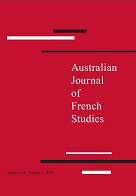
AUSTRALIAN JOURNAL OF FRENCH STUDIES
Fostering Interdisciplinary Dialogue in French ResearchAustralian Journal of French Studies, published by Liverpool University Press, serves as a premier academic platform dedicated to the exploration and dissemination of research in French studies. With a robust history dating back to 1975, this journal focuses on a diverse array of subjects including cultural studies, history, linguistics, and literature, evident from its competitive Q2 and Q3 rankings across various categories in the 2023 quartiles. Although currently not open access, it prides itself on maintaining high scholarly standards, as reflected in its Scopus rankings across multiple disciplines. Through the evaluation of a broad spectrum of interdisciplinary works, the journal aims to foster a deeper understanding of French language and culture among researchers, professionals, and students alike. As it continues to publish valuable insights and foster academic dialogue, the Australian Journal of French Studies remains an essential resource for those interested in the nuances of the Francophone world.

TWENTIETH CENTURY LITERATURE
Charting New Territories in 20th Century LiteratureTWENTIETH CENTURY LITERATURE is a renowned journal published by Hofstra University Press, dedicated to the exploration and analysis of literature and literary theory from the twentieth century. With a focus on both established and emerging voices in the field, this journal serves as an essential resource for researchers, professionals, and students who seek to deepen their understanding of significant literary movements and trends. The journal holds an impressive Q2 category ranking in Literature and Literary Theory as of 2023, showcasing its impact and relevance in the academic community. Though not an open access journal, it provides valuable insights and scholarly discussions that contribute to ongoing debates in literature studies. Covering a converged period from 2002 to 2014 and continuing from 2016 to 2024, TWENTIETH CENTURY LITERATURE positions itself as a pivotal platform for thought-provoking literature critique and scholarly inquiry, making it an indispensable addition to any academic library or personal collection.
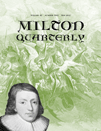
MILTON QUARTERLY
Unraveling the Rich Tapestry of LiteratureMILTON QUARTERLY, published by Wiley, is a premier academic journal in the field of Literature and Literary Theory. Since its inception in 1967, it has become a leading platform for scholarly discourse, focusing on the works and influence of John Milton and extending to broader themes in literary studies. With an impressive Q1 ranking in its category, the journal is recognized for its high-quality peer-reviewed articles and contribution to advancing literary scholarship. Although it currently does not offer open access options, its impact in the academic community is undeniable, boasting publications that resonate well beyond its pages. The journal is an invaluable resource for researchers, professionals, and students alike, keen on exploring the intersections of literary theory, history, and criticism, making significant contributions to the understanding of literature throughout the centuries.
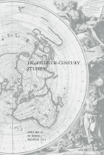
EIGHTEENTH-CENTURY STUDIES
Exploring the intricacies of the 18th century.Eighteenth-Century Studies, published by Johns Hopkins University Press, serves as a critical platform for scholars exploring the rich tapestry of the 18th century. With an ISSN of 0013-2586 and an E-ISSN of 1086-315X, this journal provides in-depth analyses and interdisciplinary perspectives that are essential for understanding the cultural, political, and literary movements of the time. As a Q3 ranked journal in both Arts and Humanities and Cultural Studies as of 2023, it occupies a vital niche in academic discourse, contributing to the field's vibrant scholarship despite its current ranking within the mid-tier of the Scopus rankings. This journal encourages submissions that present innovative research and engage with various methodologies, thereby fostering a deeper appreciation for the complexities of the 18th century. While it currently does not offer open access options, its esteemed reputation and commitment to quality scholarship make it an invaluable resource for researchers, professionals, and students alike. For those interested in the nuanced intersections of history, literature, and culture, Eighteenth-Century Studies stands out as a significant and indispensable resource.

Ben Jonson Journal
Celebrating the Genius of Ben Jonson Through Scholarly DiscourseBen Jonson Journal, published by Edinburgh University Press, is a distinguished academic periodical dedicated to the examination of the works and contributions of the esteemed playwright and poet, Ben Jonson. Since its inception in 1996, this journal has served as a vital platform for interdisciplinary research in the fields of literature and literary theory, fostering a deeper understanding of Jonson’s impact on the literary canon and cultural discourse. With an ISSN of 1079-3453 and an E-ISSN of 1755-165X, the journal occupies a notable position in the academic landscape, currently ranked in the Q4 category of the Scopus Arts and Humanities Literature and Literary Theory metrics and holding a percentile rank of 77th. Although it does not offer open access, the journal is committed to embracing rigorous scholarly standards and advancing critical dialogue among researchers, professionals, and students alike. Its geographical roots in the United Kingdom only amplify its relevance in the global literary community, making the Ben Jonson Journal an essential resource for those seeking to explore the complexities of early modern literature.

Studia Theodisca
Navigating the Nexus of Culture and LiteratureStudia Theodisca is a distinguished academic journal published by Milano University Press that has been contributing to the fields of Cultural Studies and Literature and Literary Theory since its inception. With an ISSN of 1593-2478 and E-ISSN 2385-2917, this Open Access journal, available since 1994, ensures that research is freely accessible, fostering a global exchange of ideas. Located in Milan, Italy, the journal has gained traction within the academic community, reflected in its rankings: Q4 in Cultural Studies and Q3 in Literature and Literary Theory as of 2023. Despite its relatively new presence in Scopus, being placed in the ranks of 733 out of 1106 for Literature and Literary Theory and 1092 out of 1304 for Cultural Studies, it remains committed to advancing scholarly dialogue and exploring diverse narratives. Studia Theodisca serves as a vital platform for researchers, professionals, and students seeking to engage with innovative contributions and contemporary thought in these dynamic areas of study.
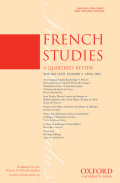
FRENCH STUDIES
Navigating the Intersection of History and LiteratureFRENCH STUDIES is a premier academic journal published by Oxford University Press, dedicated to advancing the fields of Cultural Studies, History, Linguistics, and Literature. Established in 1947, the journal has become a significant platform for interdisciplinary research, reflecting on the complexity and richness of French cultural and literary heritage. With an impact factor that positions it in Quartiles Q2 and Q3 across various categories, including Literature and Literary Theory, FRENCH STUDIES is recognized for its scholarly contributions and insights into historical narratives, linguistic developments, and cultural analyses. The journal does not currently offer open access options, yet it remains an essential resource for researchers, professionals, and students seeking to deepen their understanding of French studies and its global implications. The journal's commitment to quality and intellectual rigor is evidenced through its Scopus rankings, making it a valuable asset for the academic community in the United Kingdom and beyond.
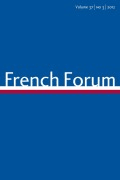
FRENCH FORUM
Redefining French Studies through Innovative ScholarshipFRENCH FORUM is a distinguished journal published by the Department of Romance Languages at the University of Pennsylvania, focusing on the rich tapestry of literature, visual arts, and performing arts within the French-speaking world. With an ISSN of 0098-9355 and an E-ISSN of 1534-1836, the journal has evolved since its inception, now covering diverse topics from 2002 to 2023. Although currently ranked in the fourth quartile in both Literature and Literary Theory and Visual Arts and Performing Arts, it provides a platform for emerging voices and critical discussions, making it an essential resource for scholars and practitioners alike. FRENCH FORUM aims to cultivate interdisciplinary dialogue, offering insights that resonate with contemporary cultural and literary studies while supporting the exploration of both canonical and avant-garde works. Despite its open access status, the journal continues to be a relevant player in academia, inviting contributions that challenge, shape, and redefine the landscape of French studies.
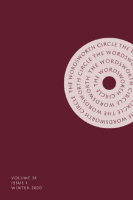
WORDSWORTH CIRCLE
Illuminating Literary Landscapes with Rigorous AnalysisWORDSWORTH CIRCLE, an esteemed journal published by University of Chicago Press, serves as a pivotal platform for scholars and enthusiasts in the fields of Cultural Studies and Literature and Literary Theory. With a firm foundation established from 2002 and expected to continue through 2024, the journal is recognized for its rigorous scholarship, evident in its prestigious ranking of Q1 in Literature and Literary Theory and Q2 in Cultural Studies for the year 2023. Although it is not an open-access journal, its valuable contributions to the discourse surrounding literary analysis and cultural critique make it a significant resource for researchers, students, and practitioners seeking to deepen their understanding of these dynamic fields. The journal's ISSN is 0043-8006, and it operates out of Chicago, IL, with its influence resonating across academic institutions and literary circles globally. By bridging historical perspectives and contemporary discussions, WORDSWORTH CIRCLE remains an essential publication for those dedicated to exploring the complexities of literature and culture.

Seizieme Siecle
Celebrating the Era of Transformation: The 16th Century RevisitedSeizieme Siecle is a distinguished journal published by LIBRAIRIE DROZ SA, focusing on the rich tapestry of the 16th century—a pivotal period that shaped the arts, literature, and cultural studies. As a publication dedicated to bringing scholarly discourse to the forefront, it features a range of critical analyses and interdisciplinary studies that examine the multifaceted influences of the era. While the journal currently does not operate under an Open Access model, its commitment to quality research is reflected in its inclusion in Scopus, albeit with limited convergence years and relatively low rankings across various relevant fields in the Arts and Humanities. Researchers, professionals, and students interested in deepening their understanding of historical contexts and their artistic expressions will find valuable insights within the pages of Seizieme Siecle. With its base in Geneva, Switzerland, the journal offers a unique perspective, contributing significantly to the ongoing academic conversations surrounding the Renaissance and its lasting impact.